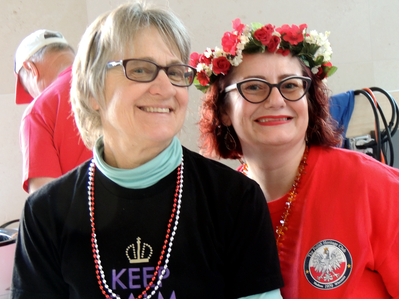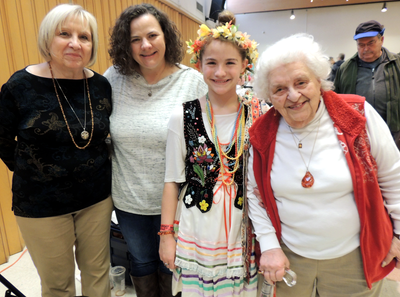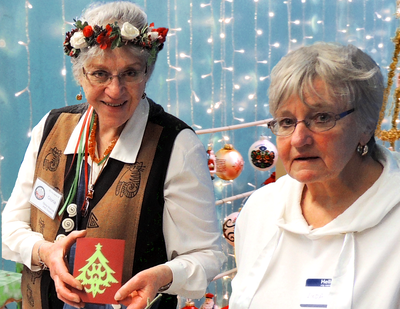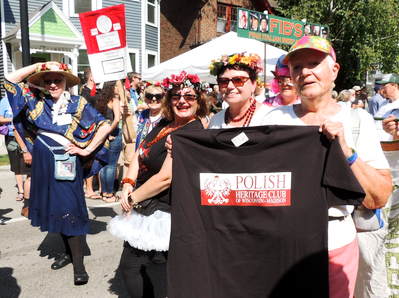author: IRENA FRACZEK
EXHIBIT OPENING ON MONDAY, NOVEMBER 11, 2019 at 6 PM
January 27, 2020 marks the 75th Anniversary of the liberation of Auschwitz.
To commemorate this event, Polish Heritage Club of Madison-Wisconsin, UW Department of German, Nordic and Slavic, UW Polish Student Association and Art Committee of Wisconsin Union Directorate - with support from UW Center for Jewish Studies - present
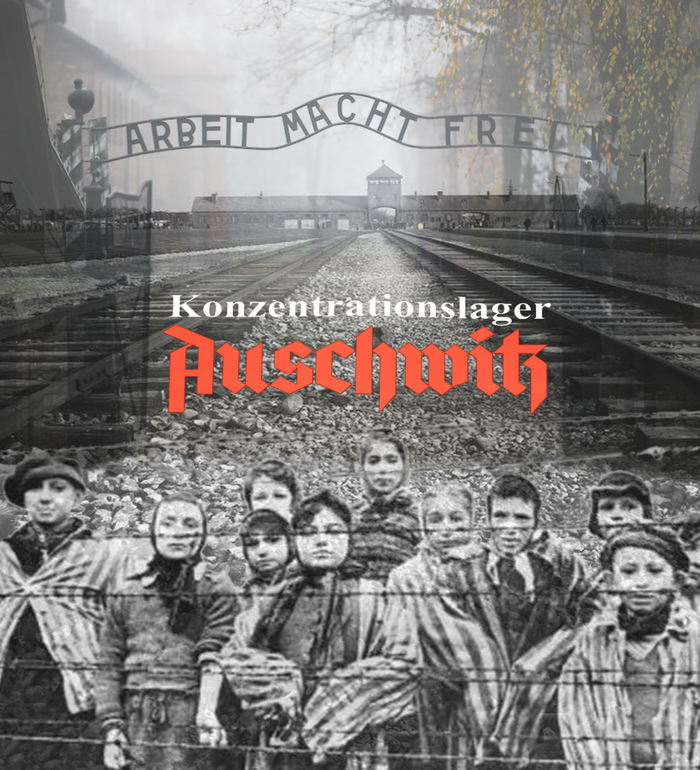
special exhibition
AUSCHWITZ-BIRKENAU
NAZI GERMAN CONCENTRATION AND EXTERMINATION CAMP
The exhibition portrays the development of Nazism in Germany, the barbaric nature of German occupation of Poland and the horrific history of the camp. Established as the instrument of terror against Polish society, in 1942 the camp became the largest site of the extermination of the Jews and consequently, the symbol of Holocaust.
November 11-16 (8am-10pm daily)
Gallery 1308 at Union South
1308 W Dayton St., Madison, WI 537155
Designed by the Auschwitz-Birkenau Memorial and Museum,
leased by the Polish American Congress, Long Island Division
LOVE YOUR NEIGHBOR: Reconsideration of the Gospels at the Time of the Holocaust
A talk complementing the exhibit will be given by Rachel F. Brennan, professor of Jewish Studies
Union South on November 15, 2019 at 7pm
1. Konzentrationslager Auschwitz: Nazi German Death Camp 2. The Origins and Aims of German Aggression 3. German Occupation Policy and the Creation of Auschwitz 4. The Beginnings of The Camp - The First Prisoners 5. Auschwitz- An Instrument of Terror Against Polish Civilians 6. The Expansion of The Camp 7. Auschwitz: Concentration Camp and Center for the Extermination of the Jews 8. Prelude to Destruction: German Policy Towards the Jews From 1933-1941 9. The Final Solution of the Jewish Question: The Holocaust 10. The Deportation of Jews to Auschwitz 11. The Facilities For Mass Murder 12. How Mass Murder Was Committed 13. Plunder 14. The Registration of Prisoners 15. Conditions in the Camp 16. Hunger 17. Prisoner Slave Labor 18. Terror and the Punishment System 19. Execution 20. Medical Experiments 21. The Women’s Camp 22. The Destruction of The Roma (Gypsies) 23. Soviet Prisoners of War 24. The Fate of Children and Young People 25. The Resistance Movement in Auschwitz 26. Escape and Mutiny 27. Exposing the Crime 28. Aid by Local Civilians 29. Evacuation - The Death March and Liberation 30. Auschwitz- The Memorial 31. Exhibit Information
In addition to photographs of Auschwitz prisoners and related documents, many panels present the drawings depicting the indescribable hardships of everyday life in the camp prisoners and the horrors of atrocities committed against the prisoners. The authors of these depictions include:
- Jan Komski (one of the first arrivals to Auschwitz, later the illustrator working for the Washington Post),
- Władysław Siwek (well known illustrator and director of the Auschwitz -Birkenau museum in 1952-1953),
- Bronisław Czech (famous in the interwar Poland champion skier with no previous drawing skills);
- Mieczysław Kościelniak (Chech's mentor in graphics arts and friend of Father Maksymilian Kolbe, who sacrificed his life to spare the life of another prisoner panel 16).
- Dina Babbitt née Gottliebova (author of the Romani portraits - see panel 22 - drawn for the infamous Dr. Mengele in exchange for sparing her mother and herself from the gas chamber)
The PHC Book Club
The Book Club members read and discuss a variety of books
about Polish heritage and/or written by Polish authors.
Here is the list of books we have explored over the years.
FOURTH MEETING: 7pm on November 13, 2018
Topic: JAN SOBIESKI AND THE BATTLE OF VIENNA
click here for location and contact information
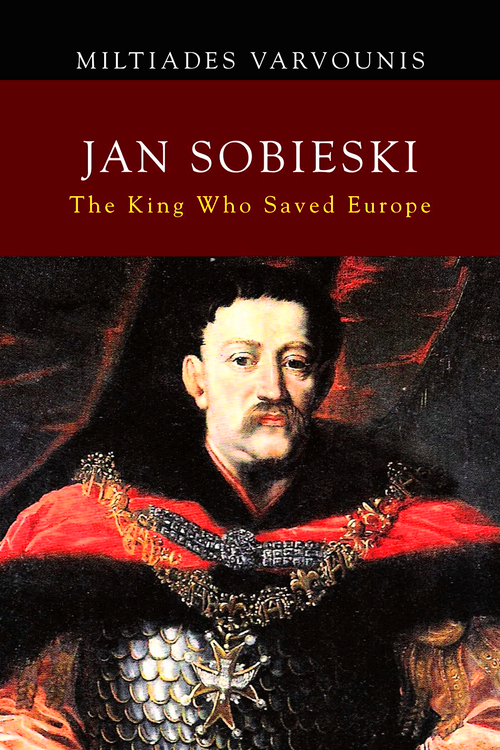
JAN SOBIESKI:
The King who Saved Europe
by Miltiades Varvounis
From the review by Robert Strybel: "Jan Sobieski was one of the most extraordinary and visionary monarchs of the Polish-Lithuanian Commonwealth from 1674 until his death. He was a man of letters, an artistic person, a dedicated ruler but above all the greatest soldier of his time. Popular among his subjects, he won considerable fame for his decisive victory over the Ottomans at the walls of Vienna (1683)." .... Known to the Turks as the Lion of Lechistan, his greatest triumph was of course the victory of the some 80,000 Polish, Austrian and German troops under his command over a numerically superior 130,000-strong Turkish force in the September 1683 Battle of Vienna. The turning point of the battle, which had been mainly an infantry clash, came when the Polish monarch had his legendary Hussar heavy infantry charge down a hillside into the fray, striking terror in the hearts of his Turkish foes. Within hours it was all over. Ever the pious Catholic, in a letter to Pope Innocent XI Sobieski modified Julius Caesar’s well-known quote (“We came, we saw, we conquered”) into a more devout and modest: “We came, we saw, God conquered!” The pope called him “the savior of Christendom,” knowing that the victory had prevented Europe from falling under Muslim domination"
From the author's website: "... Miltiades Varvounis was born in Athens, Greece in 1980. Of Polish descent, he considers himself Graecorum et Polonorum filius (a son of Greeks and Poles). His areas of research include, among other things, "Sarmatian" civilization of the Polish-Lithuanian Commonwealth, Polish, Lithuanian, and Turkish histories. Alongside his professional activities, Miltiades Varvounis has always considered it his national duty to study Polish civilization and to promote the achievements of the Polish people to the whole world. Miltiades Varvounis lives in Athens. He also spends some time in the Polish towns of Łask and Chojnice, and in Kaunas, Lithuania. ..."
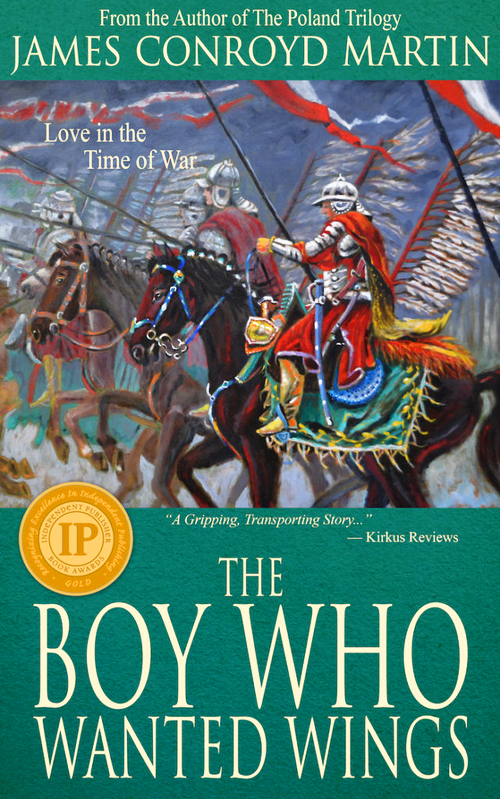
The Boy Who Wanted Wings
by James Conroyd Martin
From the customer review on the Amazon website: "An absorbing historical novel throughout, this is the tale of a fascinating time, place and subject that have been given little attention. For those of us who love stories of knights, courageous underdogs, adventure and romance -- and love to learn about little known slices of history -- James Martin's novel offers a window into the rich culture of 17th century Poland and the world of the Polish Winged Hussars. The Hussars were an elite, knight class of formidable cavalrymen who took on and defeated forces much larger than theirs over the span of centuries. The story culminates in the Battle of Vienna, a real conflict in which Christendom stood on the brink of destruction. James Martin does a lovely job weaving in his characters and bringing the reader along for the ride."
ADDITIONAL BOOKS ON THE TOPIC
The Enemy at the Gate: Habsburgs, Ottomans, and the Battle for Europe by Andrew Wheatcroft. "...In 1683, an Ottoman army that stretched from horizon to horizon set out to seize the “Golden Apple,” as Turks referred to Vienna. The ensuing siege pitted battle-hardened Janissaries wielding seventeenth-century grenades against Habsburg armies, widely feared for their savagery... Each side was sustained by the hatred of its age-old enemy, certain that victory would be won by the grace of God.....A gripping work by a master historian, The Enemy at the Gate offers a timely examination of an epic clash of civilizations" /Galen Wiley on the LibraryThing website/
Polish Winged Hussar 1576–1775 (Warrior) by Richard Brzezinski. This book examines the origins and development of the Polish 'Winged' Hussars. Using many years' painstaking research drawn from unpublished Polish sources, the author provides a rounded view of the training, tactics, appearance and experiences of these legendary and fascinating warriors. Most dramatic of all Hussar characteristics were the 'wings' worn on the back or on the saddle, although not all Hussars wore them, and their purpose has been fiercely debated. The Hussars terrified the Turks, Tatars, Muscovite boyars, Ukrainian Cossacks and Swedes, who did everything to avoid facing them directly in battle..." /Amazon website/
The Siege of Vienna: The Last Great Trial Between Cross & Crescent by John Stoye. "...In his splendid study The Siege of Vienna, the Oxford historian John Stoye provides a detailed account of the intricate machinations between the Habsburgs and the Ottomans. Mr. Stoye's description of the siege itself is masterly. He seems to know every inch of ground, every earthwork and fortification around the Imperial City, and he follows the action meticulously..." /Eric Ormsby in The Wall Street Journal/
THIRD MEETING: 7pm on August 13, 2018
Topic: STORIES FROM THE COMMUNIST ERA IN POLAND
click here for location and contact information
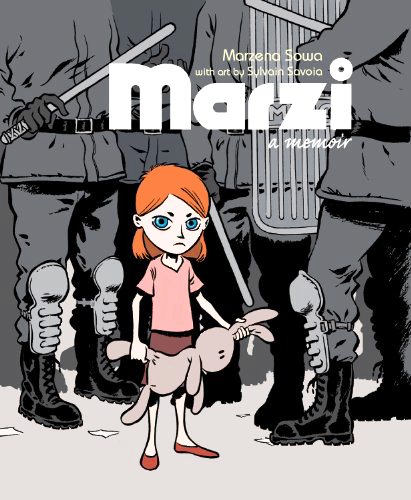
MARZI: A Memoir
by Marzena Sowa (text) and
Sylvain Savoia (illustrations)
This graphic novel tells the true story of Marzena Sowa growing up in Stalowa Wola, when Soviet control over Poland was slowly coming to the end. Presented as a series of vignettes, the memoir spans a decade between Marzi's birth in 1979 and the landslide victory of Solidarity in the 1989 elections. [In 1988, around 10,000 workers of the arms-producing Steelworks in Stalowa Wola went on strike that was dubbed "the fourth nail in the coffin of Communism."] This English edition of works by the Polish writer and her Belgian boyfriend combines four collections of comics originally published in Belgium.
S.M. Robare's review on the Amazon website: "... Getting a chance to peek behind the iron curtain and to see what Polish life was like was fascinating, particularly because it illustrated how normal the day to day really was. There are a lot of interesting shorts, like what it was like preparing for the Christmas dinner by keeping a live Carp in the bathtub for a few days, or the routine of waiting in lines for grocery staples. But what surprised me the most was the overall tone of the stories and how honestly Sowa presents herself as sort of a bratty spoiled child. Simply judging from the cover illustration, which features a young scowling Marzi awkwardly manhandling a plush bunny, tiny amongst a sea of Polish soldiers in riot gear, you get the impression that this would be a darker memoir about the struggle and hardships of life. While this is certainly a part of the backdrop to the story, it's actually more upbeat and a tad whiney..."
Michel Scott's review on the goodreads website: "... Double-speak and double-life, the main elements of surviving life under Communism, were well represented in this novel. The staged marches of joy accompanying the 1st of May (the international day of Communism) vs the silent resistance (here: turning off tvs, wearing resistors at the sleeve). The empty fridges vs the joyous birthdays staged for the kids. The angry sellers at the department store, more like little dictators of necessary resources than employees providing services. The expectation that Communism will imminently fall vs the surprise and total loss of lucidity when it did..."
THE DOG CALLED HITLER
by Walerian Domański
A collection of 63 short stories using humor, satire and grotesque to give readers insight into the hardships of every-day life and struggle of Polish people's to survive under the oppressive and dehumanizing communist regime.

The KIRKUS Review: "An eclectic gathering of short stories illustrating the burden of communism. Domanski’s debut collects stories, often based in truth, devoted to Polish anti-communist activists. The brief pieces, some barely two pages, aim to capture the moral confusion and physical deprivation wrought by authoritarian communistic rule. Besides functioning as cautionary tales about tyranny begotten from political idealism, each one is like a moral parable, describing a struggle the author encountered... .... The author admits that some of these remembrances are woven out of both fact and fiction—and some are simply fictional—but this doesn’t detract from the power of the writing’s moral instruction. Never tediously didactic, this is a beautifully written collection of historically poignant vignettes. A serious set of meditations on communism delivered with style and wit..."
Janelle Fila's review on the Readers' Favorite website: "... I liked the way these short stories alternated between humorous and satirical, happy and depressing. It was a nice mix and really showed what life could be like: cruel and harsh one day, but with benefits and high spots the next. Readers will appreciate the historical content of this book and marvel that many of these scenes and tales are based in truth. Readers will come away from this story, shaking their heads because of the sadness and despair that fills the pages, but also come away with a new found resolve. If the poorest, most destitute people can find a way to survive and thrive, surely so can we..."
About the author: Before arriving to the United States in 1986 as a political refugee, Walerian Domański joined the Solidarity movement during the 1980 wave of strikes in Poland. He was a Solidarity organizer in the state-owned construction factory in Świdnik and later became an editor of the regional underground publication "Nothing About Us Without Us" (Nic o Nas bez Nas) published in Dzierżoniów. He participated in the historic First National Solidarity Convention (9/26-10/9/1981) as a delegate from Lower Silesia. He also took part in the successful action of hiding the printing presses housed in the regional Solidarity office (12/3/1981) and just two weeks later, was briefly arrested after Poland's communist government declared the martial law (12/13/1981). For the remainder of his years in Poland (1981-1986), he was involved in the publishing and distribution of the underground press materials.
Mr. Domański is a member of the Barnes&Noble writers' group in Rochester, MI and recipient of the Kresge Fellowship and three awards from the Friends of Polish Arts in Detroit, MI. He wrote his first stories in 1968 and started creating cartoons in 1977. He holds the master of science degrees in structural engineering (from the Technical University in Wrocław, 1967) and civil engineering (Wayne State University, 1994).
.............................►check also this pdf with supplemental information◄
SECOND MEETING: 7pm on May 1, 2018
Topic: "Freedom Climbers:
The Golden Age of Polish Climbing"
click here for location and contact information
Patrice Dabrowski (Cosmopolitan Review): "Hard to put down, Freedom Climbers is expertly and engagingly penned by Bernadette McDonald, the author of a number of prize-winning books on mountaineering. This time she has painstakingly pieced together a story of the over two decades of Himalayan exploits of Polish climbers, women as well as men, many of whom she knew personally. The figures and events of the glory days of Polish mountaineering are brought vividly to life. Both story and book are fully deserving of the years of attention lavished on them. A sign that McDonald’s effort has been appreciated by more than the present reviewer: Freedom Climbers has already won three prestigious book awards, has been translated into Polish and is being translated into other languages....
Born during or following World War II, these Poles surmounted hurdles that climbers from the west could hardly imagine. Living in an unfree country – communist-ruled Poland – they surmounted difficulty after difficulty to become the dominant climbing dynasty. McDonald is sensitive to the particular circumstances that shaped Polish high-altitude climbing: the chronic shortages of food supplies and nonexistence of proper alpine equipment within Poland, the insufficient funds to cover international travel and expenses even when climbers were granted permission to leave the country, the disconnect between the communists’ penchant for control and the alpinists’ premium on freedom. The best Polish climbers were masters of the art of the seemingly impossible. Unafraid of taking risks, they bent rules back home as well as abroad (for example, engaging in black market trading on an international scale to finance their trips) in order to be able to reach the rarified realm of the mountains, where they felt truly alive."
Quill & Quire Review: "McDonald introduces readers to a cast of characters who rebelled against the oppression and poverty of postwar Poland by dedicating their lives to breaking climbing records, chronicling these climbers as they bag first-route ascents, first winter ascents, and first multiple ascents. Their daring often resulted in death, but McDonald 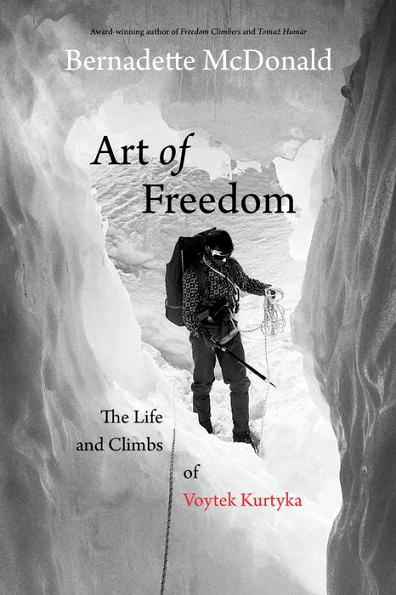 does not condemn them for an ambition that at times seems no more admirable than a death wish. As the death toll rises, readers learn that big egos on big mountains cause big problems, infusing McDonald’s narrative with drama, conflict, and high stakes.
does not condemn them for an ambition that at times seems no more admirable than a death wish. As the death toll rises, readers learn that big egos on big mountains cause big problems, infusing McDonald’s narrative with drama, conflict, and high stakes.
The book offers an unflinching examination of the psychology of risk, the extent to which one’s personality is shaped by one’s time and place, the connection between nature and spirituality, and the danger of egotism. McDonald asks big questions and does not succumb to easy answers. She shows the lengths to which these climbers went to imbue their lives with meaning, and then asks: was it worth it?"
First published in 2011, the book Freedom Climbers won the Banff Mountain Book Festival Grand Prize (2011), Boardman Tasker Prize for Mountain Literature (2011) and American Alpine Club Literary Award (2012). In 2017, Bernardette McDonald won the Boardman Tasker Prize again - this time for her new book about Polish climbers, Art of Freedom: The Life and Climbs of Voytek Kurtyka.
FIRST MEETING: 7pm on February 6, 2018
TOPIC: "The Chosen Maiden"
click here for location and contact information
Dana Hansen (Quill & Quire): "Many works of fiction take as their inspiration true events and persons of historical significance, but few do so as lovingly and imaginatively as Eva Stachniak’s fifth novel. The Chosen Maiden is a fictionalized account of the remarkable life and accomplishments of ballet dancer and choreographer Bronislava (Bronia) Nijinska, sister to the legendary Russian ballet dancer Vaslav Nijinsky. Set in the years 1894 through 1939, and told from Bronia’s perspective, The Chosen Maiden delves into the workings of an artist’s mind and reveals the resiliency of art in a time of worldwide political upheaval and war... "
As children of distinguished Polish-born dancers, Bronia, Vaslav, and their older brother, Stassik, find themselves destined for a competitive life in the all-consuming world of the ballet. Vaslav quickly emerges as a rising star in the Russian Imperial Ballet School, overshadowing his younger sister, who is no less ambitious or talented. For Vaslav, fame and accolades come easily and opportunities present themselves to dance on world stages with Sergei Diaghilev’s newly formed Ballets Russes. Bronia is swept along in her famous brother’s wake, given small roles to dance, but always dreams of moving beyond her classical training to newer, more modern and exciting ways of dancing: 'Ballet needs a revolution, we say. Of colour, of music, of movement. Russian art needs freedom from the past.'".
Hellen Heller (Publishers Weekly): "The book takes readers into the controversial 1913 premiere of Stravinsky’s The Rite of Spring, in which Vaslav casts Bronia as the Chosen Maiden who dances herself to death, and then follows them both into adversity. Stachniak brilliantly brings the story of Bronia, the lesser-known Nijinsky, to life. She has an excellent command of the period and the dance world, and an ability to draw characters who will enrapture the reader..."
Maria Pelletier (Cosmopolitan Review): "Chosen Maiden, a novel about Nijinska, also tells us a lot about her times, specifically in the waning days of Imperial Russia. The book ends in 1939, on a ship to America, as the Second World War begins. She is heading towards a new place, hoping to “find the strength for another struggle”, after devastating personal losses. I am not sure why the author chose to end Bronia’s story at this stage of her life, though it is clearly a turning point. I was moved to research her later life to see what happened to her in America, so I would have welcomed a postscript with additional details of her life after 1939.....
Chosen Maiden, rescuing Nijinska from her brother’s shadow, reveals an artist, one who knows that “to excel, I have to be strong, resilient, see more, understand what is hidden to others”, and also, as her brother told her, that “Art is all that matters, Bronia. Everything else is distraction."
Youtube video discussing the art and people of the time
October is the ....
POLISH HERITAGE MONTH
Polish American communities celebrate it since 1981.... read more


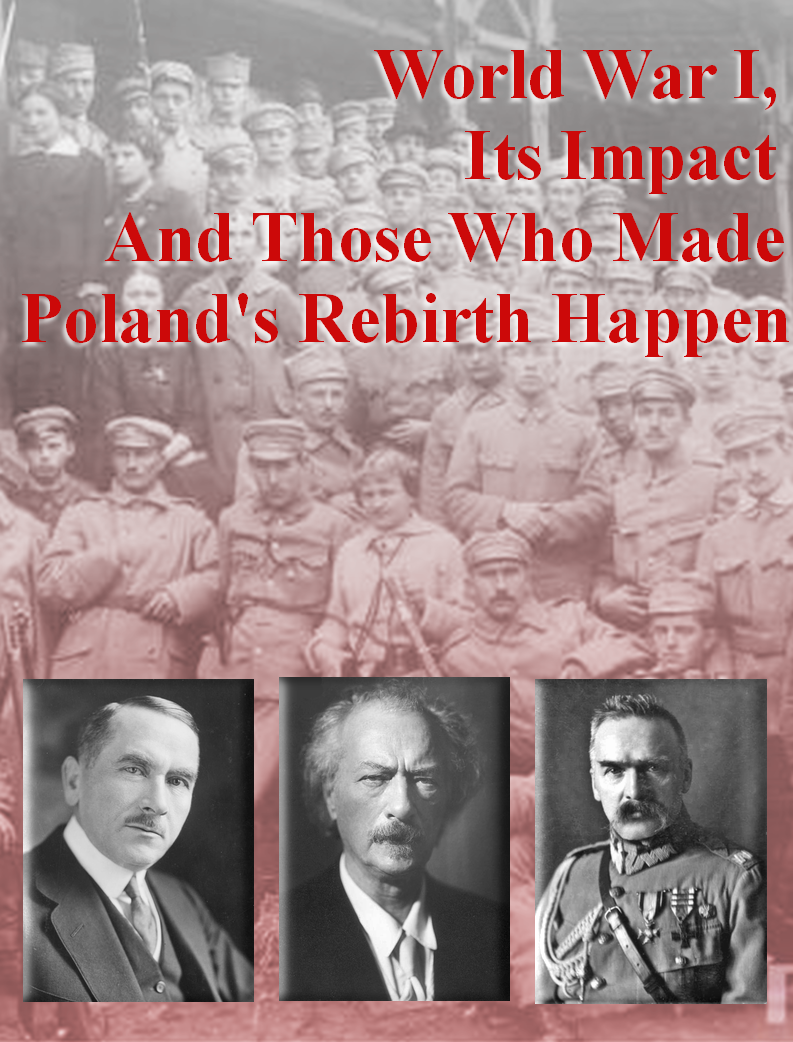
POLISH-RELATED EVENTS IN MADISON
OCTOBER 2018
October 5: Monthly PHC-Madison Breakfast
October 20: PHC sponsored screening of the historical epic "THE BATTLE OF WARSAW 1920"
Click on each line above to see details
See our calendar for more events
HIGHLIGHTS OF POLISH-RELATED EVENTS
IN MADISON AREA, SEPTEMBER 2018
September 7: Monthly PHC-Madison Breakfast
September 9: Polish Picnic in Devil's Lake
September 16: PHC-Madison in Willy Street Parade
September 19: Grażyna Auguścik & John Kregor concert
September 22: Polish Genealogy Workshop
September 28, 29 & 30: Emanuel Ax in MSO concert
Click on each line above to see details
See our calendar for more events
PHOTOS from the 2018 WILLY ST. FAIR & PARADE
A flurry of events scheduled for September is the best indication that the cucumber season (Polish sezon ogórkowy) has come to the end. In Poland, like in several other countries, this phrase refers to a slowdown in cultural and political life that still tends to occur in summer. Why are cucumbers used in this phraze is anybody's guess but they fit well the seasonal preoccupation with growing and preserving food for winter. Cucumber vines bear fruit all summer long (yes, botanically speaking, cukes are fruits and not veggies) and Poles love to make their delicious cucumber pickles in tradition that goes back before Christianity.

PICKLING CUCUMBERS THE POLISH WAY
It was a long way for cucumbers to reach Poland. Cultivated for over 4,000 years, the cucumber plant first spread from native India to China, the country still producing over 75% of the world's crop. The plant arrived to Europe via ancient Greece but it was the Romans who left behind numerous descriptions of its cultivation and conservation methods. Their favorite, pickling in salty brine (believed to originate either in China or Mesopotamia), spread through and beyond the vast expanse of the Roman Empire. Interestingly enough, the oldest archeological evidence of its use in Europe comes from Kraków and dates back to somewhere between A.D. 650 and 950.
Over 90% of cucumber crop in Poland (the 10th largest producer in the world) is preserved and the main difference between two major techniques used for this purpose is the use of vinegar. The most popular is the older, vinegar-free, salty-brine pickling technique that relies on the lacto-fermentation. In this process, friendly anaerobic bacteria convert sugars into lactic acid that inhibits the growth of harmful bacteria and molds. The second method is used in Poland since the XVIII-XIX century and takes advantage of the vinegar's conserving properties.
Ingredients for 1 quart jar
8 to 10 pickling cucumbers
1 heaping tablespoon of sea salt
1 quart of spring water, boiled
1-2 stems of dill plant, washed
3-5 cloves of garlic, peeled
several slivers of fresh horseradish root
several leaves of grape, cherry or oak
1 teaspoon mustard seeds (optional)
1 bay leaf & several peppercorns
Dissolve salt in boiled water and let it cool. Arrange leaves at the jar bottom. Tightly pack the cucumbers into the jar. Fill in the interspaces with folded dill and all other remaining ingredients. Pour the salt solution up to the brim making sure that all ingredients are fully immersed. Loosely cap the jar with a lid so that fermentation gases can escape and leave the jar in a dark place. The brine will slowly cloud and some of it may seep out, so place a jar on some dish to catch it. Depending on the room temperature, you will get ogórki małosolne in about 2-4 days. For ogórki kiszone, wait about 2-3 weeks. They will be ready when the brine clears.
Pickles made using these methods taste differently and have distinct names in Polish. Cucumbers treated with vinegar are called ogórki konserwowe or korniszony. Some people, though, reserve the second name for the very tiny vinegar pickles. Others use it only for pickles produced with a mix of both methods (salty brine soak before the vinegar finish).
Cucumbers fermented in salty brine are called ogórki kiszone or ogórki kwaszone. But read the fine print on commercial products because the second name might be used to describe a lower-quality pickles obtained by adding acid to artificially stop the fermentation process (the natural fermentation process takes about 2-3 weeks and comes to the end all by itself when the level of acidic components reaches 1.4-1.7 percent). Last but not least, ogórki małosolne (low-salt cucumbers) are basically a sweeter version of ogórki kiszone consumed after the first 2-4 days into the fermentation process.
Poles enjoy pickling cucumbers so much that competitions are held in various communities over the summer. Take for example Zielona Góra, where such contest became an annual attraction. Every summer, people gather to watch the pickling process and then two weeks later, to sample and judge the results (click here for video and photos). On the other hand, the citizens of Szczecin, launched the first "ogórki małosolne" championship this year, shortening the event's span to just three days (click here to see photos). Competitors guard their recipes closely, however, telling only that the secret to success is the right amount of salt in the brine and a good choice of other ingredients.
 So, is it difficult then to make ogórki kiszone and/or ogórki małosolne? Not really if you have some understanding of the fermentation process. Therefore, in addition to the basic recipe (see the insert above), here is a list of pointers that can make your efforts more successful:
So, is it difficult then to make ogórki kiszone and/or ogórki małosolne? Not really if you have some understanding of the fermentation process. Therefore, in addition to the basic recipe (see the insert above), here is a list of pointers that can make your efforts more successful:
Cucumbers - pickling cucumbers are best to use because in comparison to the slicing varieties, their skin is less bitter and seeds smaller & less numerous. The cucumbers should be relatively small (up to 4-5 inches long). The larger ones tend to get mushy - or even empty inside - as they collect too much carbon dioxide released during the fermentation process. It's best to start with the freshly picked cukes before they lose their natural crispness. But if needed, pre-soaking in ice water for several hours can usually restore their firmness. Note also that cucumbers fertilized with too much nitrogen do not make good pickles.
Dill and other ingredients - Polish style pickles owe their delightful flavor to the right mix of dill, garlic and horseradish. The entire dill plant can be used including roots, stems, leaves and seeds. But flowers can be problematic because they have an enzyme that makes cucumbers mushy by speeding up decomposition. On the other hand, the crunchiness of pickles can be increased by adding tannin-containing leaves of such plants grapes, black currents, cherries, and even oaks. The brine is sometimes spiced up with mustard seeds - as well as peppercorns, bay leaves, all spice, coriander seeds and bay leaves- although purists argue that the latter spices should be used only for vinegar pickles.
Salt - never use the iodized salt because iodine inhibits the growth of beneficial bacteria. Avoid also salt that has other additives (like anti-caking agents in table salt or kosher salt - the latter might be also too harsh). The best is the sea salt made of evaporated sea water or mined from the ancient sea beds. Salt concentration in brine can vary between 20 to 60 grams of salt per liter of water (2.7–8.0 oz/US gal). Since salt slows the fermentation process, use less salt for quick, half-soured pickles (ogórki małosolne) and more salt for the fully-soured pickles (ogórki kiszone).
Water - spring or well water is best because chlorine in tap water kills the beneficial bacteria. Boil water for several minutes to remove as much dissolved oxygen as possible. Add salt to water only after boiling because evaporation will throw off (increase) the intended salt-water ratio and remove some micro-elements present in salt. Some recipes call for pouring hot brine over cucumbers but keep in mind that high temperature of both the brine and the air speeds up the fermentation process. According to most sources, it's best to cool the brine to room temperature, which should be about 60 – 75 degrees Fahrenheit.
Container - larger quantities of brine pickles are traditionally produced in oak barrels but stoneware crocks and glass jars are best for pickling at home. Ceramic crocks protect the pickles from light but glass jars are cheaper and more practical for two reasons. First, they let you see what's going on inside and second, you can vary ingredients slightly from one jar to another. Comparing the results will help you arrive at your favorite recipe or produce flavors that suit differing tastes of other family members. The glass jars must be clean but there is no need to sterilize them. One thing is essential though: All cucumbers and other ingredients must be completely submerged in brine to ensure the oxygen-free environment needed for the beneficial bacteria. Otherwise, things can go south very quickly.
Happy Pickling!!!
Upcoming events for September 2018:
September 6, 2018 6:30 P.M. in Polish Center of Wisconsin
JONES ISLAND KASZUBES AND THEIR SAINT STANISLAUS CONNECTIONS
(with representatives of the EMIGRATION MUSEUM in Gdynia, Poland)
Discussion moderators: Dr. Angela Pienkos, Prof. Anne Gurnack, St. Stanislaus Abbe George Baird, the Emigration Museum's Deputy Director Sebastian Tyrakowski and Chief Research Officer, Rafał Kaczyński.
Two articles worth reading before the discussion:
"Jones Island Fishing Village, 1898" by Jeff Beutner (2016)
"The story behind Kaszube’s Park: Milwaukee’s smallest, strangest piece of public land" by Tyler Maas (2017)
September 7-9 at Loyola University Chicago
75th Anniversary of Polish American Historical Association (PAHA)
The program, registration materials and other information about the 3-day conference celebrating PAHA's history and achievements are available on the PAHA website, PAHA NewsBlog and the letter from PAHA President, prof. Dr. Anna Mazurkiewicz. We remember her from "The Story of Polish and East European Exiles in the United States After World War II" she told the members of PAC-Wisconsin Division and other guests of Polish Center of Wisconsin in November 2017.
The annual picnic for the PHCwi members, families and friends
Sunday, July 22nd
Goodland County Park, Shelter #1
Click here for schedule, location
and volunteer opportunities
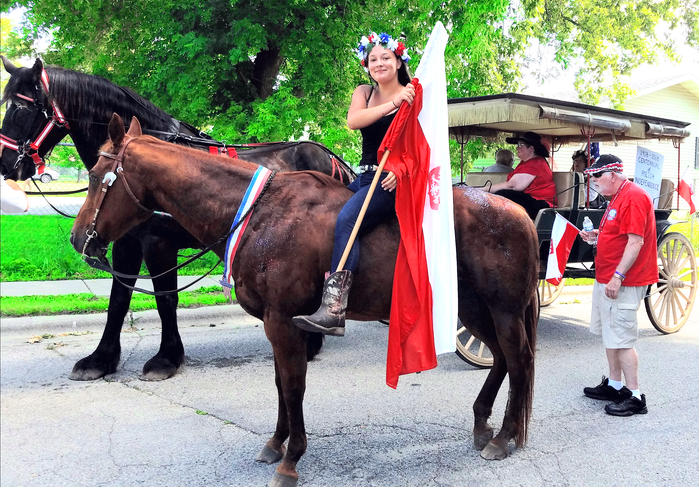
PHC members participated in the July 4th Parade in Evansville, WI
Edela Skotnicki paraded on Dakota, while Camille & Stefan Skotnicki (owners of the horses and the carriage), Jane Dunn, Gloria Welniak, and Paul & Marge Morgan greeted the parade onlookers from the carriage.
Some PHC members have been spotted also during the 2018 Polish Fest in Milwaukee (see the photo gallery below).
From the PHC's President, Alan Patek:
Vital organizations need to grow and develop. We have a great group, but how many people of Polish heritage don’t know who we are or know about the great activities that we sponsor? I’m asking all of you to help.
Between now and the end of November, take time to reach out to at least five new people of Polish background you know (friends, family, everyone). Tell them about the club and invite them to join our great group. For each new member (put your name as a referring member on their Membership Form), we will enter your name in a drawing for a free membership next year and a surprise gift.
Let’s show off the same Polish determination today that made our homeland’s rebirth possible 100 years ago. Let’s exceed our goal of increasing our membership by at least 10%.

Polish President
visits the United States
June 24-25, 2020
Polish and US Presidents, Andrzej Duda and Donald Trump, agreed on Wednesday that Polish-American relations have never been better.
From the Joint Statement
signed after the White House talks:
Poland and the United States share a centuries-old friendship and partnership based on shared values and interests, strong people-to-people ties, and mutual respect. Today we reaffirm the values that both our nations hold dear, especially democracy, the rule of law, individual liberties and freedoms, and free, fair, and reciprocal trade.
The White House talks focussed on military security, energy independence, support for the Three Seas Initiative and investments in new technology.
Virtual Summer Camp
at the Jagiellonian University
(June 26th is the recently extended deadline to apply)
Sponsored by the Polish American Congress Charitable Foundation (PACCF), the program is open to Americans of Polish descent ages 13-17 (see program description for other eligibility requirements and cost). It includes 30 hours of Polish language after a placement test and 20 hours of virtual sightseeing tours, cooking classes, dance & song workshops, learning Polish tradition and much more.
Application Form Participation Agreement
Polish movies streamed as part of the cinematic retrospective
STORIES FROM BEHIND THE IRON CURTAIN
Reverse (Rewers), June 25- July 1, 2020
Little Rose (Różyczka), July 2-8, 2020
All That I Love (Wszystko co kocham), July 9-15, 2020
REGISTRATION REQUIRED
Opportunity for children and youth to win valuable prizes in the contest
MY MOST INTERESTING MEETING WITH POLAND ONLINE
Submission deadline is June 30, 2020
For competition description and submission forms, check our
calendar entry
author: IRENA FRACZEK
Upcoming online events on Polish themes:
Professor Bohdan Szklarski of the University of Warsaw and
former US Ambassador to Poland Daniel Fried discuss
Transatlantic World Through Polish and American Eyes
Similarities and Differences of Perspectives
Thursday, June 11 at 12 pm CDT
An interview with Wojciech Soczewica
Director General of the Auschwitz-Birkenau Foundation.
Auschwitz: Preserving a Place of Terror
Wednesday, June 17 at 11:50 am CDT
Upcoming online events on Polish themes (click on the titles for details):
POLISH MUSIC ON WORT
MadPolka DJ contributes about 1/2 hour of Polish music on "Global Revolutions" show on Mondays
May 4, May 11, May 18 and May 25 (sometime between 9am d and noon)
...
...
THIRD MEETING: 7pm on July 21, 2020
click here for location and contact information
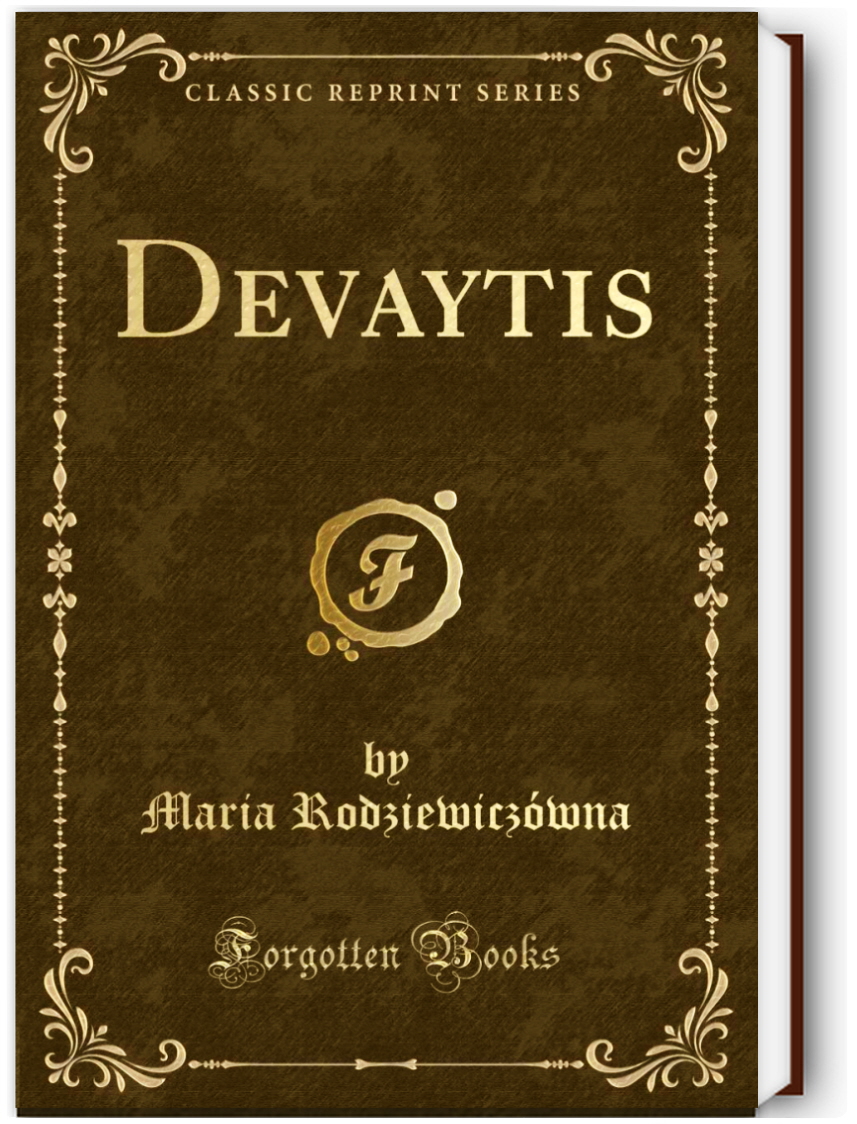
DEVAYTIS
Polish title: Dewajtis
by Maria Rodziewiczówna
translation by S. C. De Soissons
From Merlin.pl website: "Dewajtis is an escape from everyday life, troubles and fears, into the world of fairy tales and dreams, into a world that's distant but still heart moving. Dewajtis is a novel about great love - for people, land, nature. It is filled with forests, meadows, marshes, herbs, honey, smells, songs... And the eternal oak Dewajtis, a witness to Polish identity, symbol of the nation's vitality, an observer of human fate and profound, good feelings.”
Czesław Miłosz in "Search of a Homeland": "In none of the novelists I find so many realities regarding the eastern lands of the former Polish-Lithuanian Commonwealth in the second half of the 19th century or at the beginning of the 20th century.”
For the epic On the Niemen (pl. Nad Niemnem), Eliza Orzeszkowa was nominated for the Nobel Prize in Literature along with Henryk Sienkiewicz and Leo Tolstoy in 1905. The idea of spliting the prize between the two Polish writers was ultimately rejected and Sienkiewicz emerged a winner.
From "We like to read" (pl. Lubimy czytać) website: "The best of Maria Rodziewiczówna's novels, an award winner in the 1888 Warsaw Courier book competition. Taking place in Žemaitija (pl: Żmudź), this provincial manor style story is similar in climate to the published almost concurrently epic On the Niemen (pl. Nad Niemnem) by Eliza Orzeszkowa. Likewise, the characters' lives revolve around one matter only: maintaining the land, heritage and national identity; and the only measure of person's value is their attitude toward work. The main character type emerging in the book recurs in other works by Rodziewiczówna. Like a romantic poet, he is lone, self-contained and misunderstood by the world. Like a positivist ideal, he is strong, hardworking and persistent. Like everyone, he longs for love and only against love he cannot defend himself."
The book is available for reading on Google Books and other websites
POLISH ORIGINAL ENGLISH TRANSLATION
As Wisconsin is slowly reopening after the Covid-19 lockdown, here is a list of important dates and events taking place in June (see also the list of virtual tours of Polish museums below announcements):
Polish Flag Day (May 2nd)
"We celebrate the Polish Flag Day today. We look at our national colors and our national symbols that day, remembering their meaning and importance. The white and red flag unites us and reminds us that we are Poles. We look at her with pride and hope, with joy and satisfaction, and when she accompanies us away from homeland, with nostalgia and longing."
President Andrzej Duda on May 2, 2020
STAY HOME WITH CHOPIN
In the difficult time of the declared COVID-19 pandemic, one question recently popping up on the internet was: "What TV shows should we watch during the long hours at home?" My initial reaction was: "Really? Nothing better to worry about?" But after a dive into posts related to the upcoming 18th International Chopin Piano Competition (October 2-23, 20020), my personal plan (and advice if anybody asked for it) became to spend more time listening to Chopin, and Polish music in general.

The Frederic Chopin International Piano Competition (Międzynarodowy Konkurs Pianistyczny im. Fryderyka Chopina) is held in Poland's capital every five years since 1955, but its earlier editions took place in 1927, 1932, 1937 and 1949. Young pianists from all over the world enter the contest in hope for the international fame and concert/recording engagements that come with the main prizes and special awards for the best performance of mazurka, Polonaise and a piano concerto.
A record-breaking number of over 500 pianists from as many as 53 countries applied to compete in 2020 but only 164 made it to the preliminary round (scheduled for April 17-28, now moved to September 2020). The nine contestants who qualified directly to the competition included the three top winners of the 2020 National Polish Competition: Piotr Alexewicz, Adam Kałduński (1st prize in Beijing, 2019) and Piotr Pawlak (1st prize in Darmstadt, 2017) - as well as Poland's own Szymon Nehring, the 1st prize winner of the 2017 Arthur Rubinstein International Piano Master Competition in Tel Aviv, Israel.
Among young pianists already qualified to the 18th Chopin Competition in Warsaw are Avery Gagliano (18) and Evren Ozel (21) from the United States, the first and second prize winners of the 10th National Chopin Competition in Miami, Florida. Taking place every five years since 1975, this is the largest of many Chopin competitions held on the American continent. It also awards the highest cash prizes (the first prize is $100,000, as compared to 40,000 euro in the International Chopin Piano Competition in Warsaw) along with a recording contract on the Steinway & Sons label, a solo concert at Carnegie Hall and a pre-arrenged concert tour across the United States.
The National Chopin Competition in Miami had also the pleasant connection to Madison, WI connection because among its 26 contestants was Eric Tran, a doctoral student in piano at University of Wisconsin-Madison with Christopher Taylor (bronze medalist of the 1993 Van Cliburn International Piano Competition). The winner prizes evaded Eric in Miami but judging from his masterful "practice" performances around Madison shortly before the competition, he is well equipped for the successful career of a concert pianist and composer ahead.
Returning to the leading line of this post, there are numerous videos presenting stunning performances from Chopin competitions and in general, the wonderful world of music composed by the Polish musical genius. For an easy start, you can visit a youtube channel maintained by the Fryderyk Chopin Institute and presenting Chopin playlists, movies and other educational materials. You can also explore a selection of videos in the left column of this website... either way: Let's stay home with Chopin.
Irena Frączek (last edits on January 13, 2018)
CANCELLATION NOTICE
The PHC SPRING FESTIVAL
scheduled for April 5, 2020
has been cancelled
Due to the COVID-19 concerns, other events in our calendar might also get cancelled.
Stay tuned and for the safety of us all, follow the public health guidelines and restrictions.
In the meantime, see the video below showing Poland on Monday, March 16th - the first (normally work) day under the lockdown.
......
Have you heard that your Polish Ancestry can be claimed on the census form? You can do so by marking "Polish" on line 9 of the form (or line 7 for other people in the household).  Check image to the right for details.
Check image to the right for details.
All people living in the US are by law required to respond - and acknowledging Polish descent would help to determine the size of Polish American community (among other benefits).
Invitations to participate are being sent March 12-20. Respond as soon as possible but April 1, 2020 (Census Day) is the survey's key reference date. You can respond by mail, phone or online. The online questionnaire and phone service are available in Polish. Click here for the sample questionnaire and other information.
......
......
Want to learn about Poland?
2020 marks the
40th Anniversary of our club
Jane Dunn is leading the committee organizing the celebration event to be held later this year.
Please forward to her any suggestions and ideas regarding potential venue, artistic program and so on
Use contact information below the calendar in the right column ›››
to make your submissions
author: IRENA FRACZEK
►CHECK OUR CALENDAR FOR UPCOMING EVENTS◄

After phenomenal concert of the ATOM STRING QUARTET,
fans of Polish music in Madison are for another treat with the concert of the
NEW TRIO
The ensemble was founded in 2009 by Mateusz Smoczyński with his brother Jan Smoczyński (Hammond organs) and Russian drummer Alex Zinger.
The trio released two albums: “Perpendicular Realities” and “Simultaneous Abstractions.” The unique sound of violin/Hammond/ drums combination is reminiscent of the superb Luc Ponty/Eddy Louiss /Daniel Humair productions.
January 17, 8pm-11pm in Cafe Coda, 1124 Williamson St.
More information about the band and venue available on theevent's page in the PHC-Madison calendar

author: IRENA
2020 Polish music events in Madison get to a grand start with the ATOM STRING QUARTET concert
Celebrating the 10th Anniversary of the ensemble formed on January 8. 2010,
Poland's premiere all acoustic jazz and classical fusion band will perform a mix of their own compositions, folk music inspired tunes, Polish jazz classics composed by jazz violinist Zbigniew Seifert as well as pieces by classical composers, Witold Lutoslawski and Krzysztof Penderecki.
January 8, 8 pm - 11 pm in Cafe Coda, 1124 Williamson St.
More information about the band and venue available on theevent's page in the PHC-Madison calendar

ANNUAL POLISH PICNIC
for PHC members, families and friends
COME JOIN us for SUMMER FUN!
SHARE & PROMOTE POLISH TRADITIONS
MEET WINNERS of the 2019 PHC SCHOLARSHIP
10 am Setup starts - volunteers welcome!*
11 am Activities begin: music, grill, games!
12 pm Potluck lunch - smacznego!
After lunch: Music, games, Polish folk songs
*We appreciate help with the setup, serving and cleanup. Let us know
how you can help, show up early or stay to help with clean up. Dziękujemy!
Goodland County Park, Shelter #1
2862 Waubesa Ave., Madison WI 53711
Performances of the Polish National Song and Dance Ensemble " Śląsk" have been described as one of the most dazzling spectacles in the world! Named after the Poland's region called Silesia, the group was founded in 1953 by Stanisław Hadyna to preserve and showcase the unique folklore of Upper Silesia, Cieszyn Silesia, and the Beskid Mountains. While this scope was quickly expanded to include other regions of Poland, no other group presents folklore of Polish highlanders better than "Śląsk". Over the years, Śląsk has earned worldwide recognition by visiting 44 countries on five continents and giving over seven thousand concerts to an audience of over 25 million - including the group's patron Pope John Paul II. The ensemble performed in all European capitals as well as major cities throughout Africa, the United States, Australia, China, and Japan.
click here for tickets and more information
Location: The Basilica of St. Josaphat
233 S 6th St, Milwaukee, WI 53215
MAP... https://goo.gl/maps/XZQfiUnG7cp

NOT TO BE MISSED....
MUSIC OF PARAGUAY FROM THE INSIDE
A unique and FREE music concert involving Polish musicians: Daniel Luzko (piano) and Magdalena Sas (cello).
NOT TO BE MISSED....
MUSIC OF PARAGUAY FROM THE INSIDE
A unique and FREE music concert involving Polish musicians: Daniel Luzko (piano) and Magdalena Sas (cello).

December 14, 2019 (4:30 pm - 8:30 pm)
POLISH WIGILIA
Bring your friends and family to the traditional Polish Christmas Supper, to share opłatek (Christmas wafer), exchange Christmas wishes and visit with Święty Mikołaj (Santa).
Reservations and payments
are due on December 1, 2019
click here for the registration form
Rex's Innkeeper, 301 N Century Ave, Waunakee, WI 53597
After 8:30 pm, the band Universal Sound plays until midnight.
Dance the night away to your favorite songs of any era!
October is Polish Heritage Month
Twenty Years Ago:
Poland's Entry into the NATO Alliance
and How it Happened
Lecture by Dr Donald Pienkos
Professor Emeritus of Political Science
University of Wisconsin-Milwaukee
7pm on October 29, 2019
This event is free and open to the public
UPCOMING EVENTS IN MADISON AREA
October 28, 9 am-12 pm: POLISH MUSIC on WORT
Tune in to catch the last 2019 broadcast featuring various genres of contemporary Polish music. Call the station at (608) 256-2001 to share your comments and/or make musical requests.
October 28, 7-9 pm: LOVE AND MERCY: FAUSTINA
This special premiere screening of the documentary/dramatization hybrid presents the gripping story of the Polish Catholic nun and saint Faustina Kowalska and her inspiring message of mercy spreading all over the world. Presented on this day simultaneously in all major movie theaters across the United States, the movie was shut on locations in the United State, Poland and Lithuania.
October 29: Due date for Polish food preoorders
Make sure your preorder forms for Polish food to be picked up at the 2019 Christmas Bazaar are in to guarantee the foods avilability
November 9: PHC CHRISTMAS BAZAAR
All are cordially invited to the 2019 Christmas Bazaar, an annual event featuring Polish food and an opportunity to do your Christmas shopping of Bolesławiec pottery, amber jewelry, Christmas ornaments, Polish books and much, much more.
Click on each event above to see the details
Check our calendar for more events
November 13: PHC BOOK CLUB
The topic of the last club meeting of the year is King Jan Sobieski and the Battle of Vienna. (click here for details on our Book Club page)
November 18: POLISH FILM FESTIVAL part 1
Movies screened will include HAPPINNESS OF THE WORLD (Szczęście Świata) and THE BUTLER (Kamerdyner).
December 1: POLISH WIGILIA
Join us for the traditional Christmas Eve supper - note that registration for this event is due on November 14, 2018.
December 2: POLISH FILM FESTIVAL part 2
Movies screened will include SQUADRON 303 (Dywizjon 303) and BREAKING THE LIMITS (Najlepszy).
POLISH MUSIC ON WORT WILL BE AIRED ON THE FOLLOWING DATES: November 5, November 12, November 26, and December 6.
Click on each event above to see the details
Check our calendar for more events
Henry Conigsby (Watford): "The tale of how the second half of that motto turned into the cruellest of jests is widely known. Instead, let us recall them in their days of glory: so brave, so handsome, so young – the laughing hussars of the sky. I think the difference between our two countries is this. If I were not English, I should want to live as a Pole. If the men of 303 Squadron were not Polish, they would not have wanted to live at all."
John Grondelski (Polish American Journal): "The work had previously appeared in 1942 in English as Squadron 303.... ...The original text of the book is supplemented with a chapter on how Polish forces came to be in England, individual biographies of the distinguished airmen of 303 Squadron, and the Squadron’s own history (another untold story — the Kościuszko Squadron originated with American airmen who volunteered to fight for Poland during the Polish-Soviet War of 1920, three of whom lie in the famous Eagle’s Cemetery in Łwów/L’viv). Over 200 black and white photos fill its pages."
►check also this PDF about two new feature movies about the 303 SQUADRON◄
AUGUST ANNIVERSARIES
August 1, 2019
The 75th anniversary of the Warsaw Uprising (in Polish: Powstanie Warszawskie), the largest military effort carried by any European resistance movement during World War II. The Polish Museum of America commemorates this landmark anniversary with an exhibit opening on August 1, 2019.
August 8, 2019
The 75th anniversary of the famed 1st Armoured Division (in Polish: 1 Dywizja Pancerna) under the command of Major General Stanisław Maczek enters combat and plays vital role in the Battle of Normandy and the liberation of France and Netherlands.
August 16, 2019
Centennial of the Silesian Uprising (in Polish: Powstania śląskie), a series of three uprisings undertaken between 1919 and 1921 in order to make Silesia a part of the newly formed Second Polish Republic.
August 26, 2019
The 80th anniversary of the first TV program emitted in Warsaw. After the war interrupted progress in this field (with some inventions going back to the end of the 19th century), television made its return to Poland in 1952.
author: IRENA FRACZEK
JULY 27 at 7pm
Soccer International Heritage Night
Wear the Polish Heritage Club T-shirt (or just red and white) to a game played by the Madison's first soccer professional team Forward Madison SC
more information
AUGUST 2 at 5pm
PHC Fish Fry Dinner
Join us for Wisconsin's traditional fish fry dinner at Prairie Lanes (Sun Prairie) Reservations due by July 30, 2019.
more information
......
author: IRENA FRACZEK

Join us to celebrate
the 228th Anniversary of Polish Constitution
adopted by the Polish-Lithuanian Commonwealth on May 3, 1791
& the Centennial Anniversary of Ignacy Paderewski
becoming the First Prime Minister of the re-born Poland
Sponsored by the Milwaukee Society of the Polish National Alliance
7pm on May 2nd, 2019
Polish Center of Wisconsin
This event is free and open to the public
PROGRAM
A Word Of Welcome
Terry Witkowski, President of the Milwaukee Society of the Polish National Alliance and Alderman of Milwaukee's 13th District
......
HOSTED IN POLISH CENTER OF WISCONSIN
On the May 3rd Constitution
Dr Donald Pienkos, Professor Emeritus of Political Science, University of Wisconsin-Milwaukee
Ignacy Paderewski, Pianist and Statesman
Dr Neal Pease, Professor of History, University of Wisconsin-Milwaukee
Recital of Music by Paderewski and Chopin
The Hon. Francis T. Wasielewski, a Judge of the WI Circuit Court (1983-2011), President of Polish National Alliance (2004-2009) and long life pianist
A complimentary Wine & Cheese Reception
sponsored by the Milwaukee Society of the Polish National Alliance.
This event is free and open to the public.
Donald Pienkos
Prof. Emeritus, University of Wisconsin-Milwaukee
Neal Pease
Professor of History, University of Wisconsin-Milwaukee
HOSTED IN POLISH CENTER OF WISCONSIN
SECOND MEETING: 7pm on May 21, 2019
click here for location and contact information
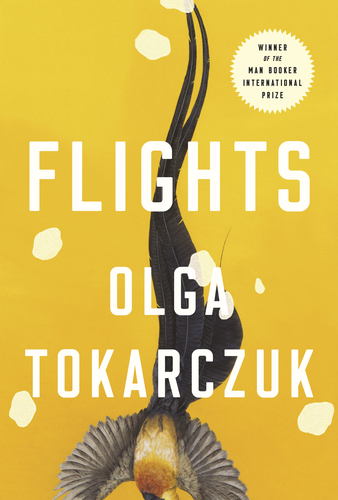
Translation: Jennifer Croft
Original title: BIEGUNI
Sean Gasper Bye (World Literature Today): "One of Europe’s most important and original voices finally, after many years, has a new book on the English-language market. Olga Tokarczuk (pronounced toh-kar-chook) is Poland’s greatest living novelist, an author of endless variety, as popular as she is controversial in her homeland. There, Tokarczuk’s books are regular best-sellers, have been adapted into films, and set the national discussion in a way many writers can only dream of. "
Watch Olga Tokarczuk explaining her work on Flights, a literary collage she dubs herself "the constellation novel." While the book's English title makes a straightforward connection to air travel, the Polish title "Bieguni" conveys a deeper, metaphysical meaning. The word "bieguni" derives from the Russian name "beguny (runners) referring to a small branch of Old Believers, a denomination that formed after a schism in Eastern Orthodox Church. Bieguni believed that you cannot fight evil ruling the world - instead, you should keep moving (both mentally and physically) because evil powers are the greatest when a man stands still. This became a motif underlying the wanderings described in the book.
Penguin Random House website: "From the incomparably original Polish writer Olga Tokarczuk, Flights interweaves reflections on travel with an in-depth exploration of the human body, broaching life, death, motion, and migration. Chopin’s heart is carried back to Warsaw in secret by his adoring sister. A woman must return to her native Poland in order to poison her terminally ill high school sweetheart, and a young man slowly descends into madness when his wife and child mysteriously vanish during a vacation and just as suddenly reappear. Through these brilliantly imagined characters and stories, interwoven with haunting, playful, and revelatory meditations, Flights explores what it means to be a traveler, a wanderer, a body in motion not only through space but through time. Where are you from? Where are you coming in from? Where are you going? we call to the traveler. Enchanting, unsettling, and wholly original, Flights is a master storyteller’s answer. .”
Zoë Hu (BookForum): "The book is like a map: including disparate parts not because they cause or connect to each other, but because their contours help clarify a wider, impersonal whole. In this way, Tokarczuk shows that even the loneliest traveler fits into a bigger scheme. In travel, “people are forced to be together, physically, close . . . as though the aim of travel were another traveler.” Even during flight, we find that, in ways both sinister and touching, we cannot escape each other.”
Lisa Appignanesi (Chair of the International Man Booker Prize judging panel):: "In Flights, brilliantly translated by Jennifer Croft, by a series of startling juxtapositions she flies us through a galaxy of departures and arrivals, stories and digressions, all the while exploring matters close to the contemporary and human predicament – where only plastic escapes mortality."
Winner of the 2008 NIKE AWARD (Poland's highest literary prize)
Winner of the 2018 MAN BOOKER INTERNATIONAL PRIZE
Named the BEST BOOK OF 2018 by Entertainment Weekly,
The Washington Post, Boston Globe, Literary Hub and Publishers Weekly
Shortlisted for the 2018 NATIONAL BOOK AWARD FOR TRANSLATED LITERATURE
Shorlisted for the 2018 WARWICK PRIZE FOR WOMEN IN TRANSLATION
author: IRENA FRACZEK
APPLICATIONS FOR THE PHC SCHOLARSHIP
ARE DUE ON MAY 15, 2019
Visit our scholarship page for details
...

Polish
Spring
Festival
Join us on Palm Sunday (April 14, 10am-3pm) to celebrate Polish Easter traditions and enjoy Polish foods, jewelry, pottery, crafts, toys, books and various fun activities.
Bring your family & friends to savor Polish lunch, dance to polka music and watch our gifted artists decorating Easter eggs.
See our calendar for location and more details
Note the April 4 deadline for food preorder
Need more encouragement?
Click the picture below to see how much fun we had last year.
Watch Olga Tokarczuk explaining her work on Flights, a literary collage she dubs herself "the constellation novel." While the book's English title makes a straightforward connection to air travel, the Polish title "Bieguni" conveys a deeper, metaphysical meaning. The word "bieguni" derives from the Russian "beguny" (runaways). In both languages it refers to a small branch of Old Believers, a denomination that formed after a schism in Eastern Orthodox Church. Bieguni believed that you cannot fight evil ruling the world - instead, you should keep moving (both mentally and physically) because evil powers are the greatest when a man stands still. This became a motif underlying the wanderings described in the book.
...
...
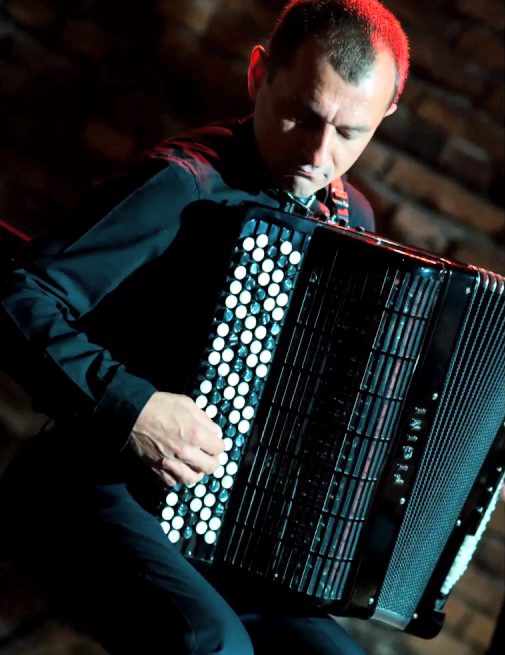
JAREK BESTER
CONTEMPORARY MASTER
ACCORDIONIST FROM POLAND
In his performing style, Jarosław Bester combines his experience in classical, klezmer, jazz and folk music to develop his own interpretation style and to create a powerful mix of technique, sensibility and creativity rarely achieved on the accordion. Because of this unique style, developed over the course of more than 30 years of performing, he is considered today one of the most original accordion interpreters worldwide. (see 2/24/2019 calendar entry for more information about the artist and location)
4 pm on February 24, 2019 ....... Murphy Hall, UW School of Music
ATOM STRING QUARTET

POLAND'S JAZZ FUSION
ALL ACOUSTIC SENSATION
Atom String Quartet is one of the most intriguing string quartets in the world, and also one of best Polish jazz bands. The group combines the capabilities of a classic string quartet (i.e. two violins, viola and cello) with strong improvisational skills in the jazz idiom, which in turn allows them to develop their distinctive new sound and establish their own original style. Their style, strongly based in jazz, also includes Polish folk, music of various regions of the world, as well as contemporary and classical music. (see the 3/3/2019 calendar entry for extensive information about the band and location details)
6 pm on March 3, 2019 ....... Music Hall at 925 Bascom Mall
The Book Club members read and discuss a variety of books
about Polish heritage and/or written by Polish authors.
Here is the list of books we have explored over the years.
FIRST MEETING: 7pm on February 12, 2019
303 SQUADRON: The Legendary Battle of Britain Fighter Squadron
click here for location
and contact information
From the Aquila Polonica Publisher: "Thrilling action story of the celebrated squadron of Polish fighter pilots whose superb daring and aerial combat skills helped save England during its most desperate hours. The 303 "Kościuszko" Squadron flew with the RAF, downing three times the average RAF score, while incurring only one-third the average casualties during the Battle of Britain. Underdog heroes who rose to defend against the deadliest German Luftwaffe attacks, the pilots of 303 Squadron were lionized by the British press, congratulated by the King and adored by the British public "
Adam R. Seipp (Sarmatian Review): "The portraits of the pilots are fascinating by themselves. In the 1943 edition pilots’ names remained concealed for fear of reprisals against families in Poland. This edition includes extensive biographical information about a number of these fliers. Their birthplaces and early careers tell a fascinating story about the changing borders of Poland in the early twentieth century and interwar creation of a Polish military establishment. The capsule biographies at the end of this edition also provide a sobering reminder of the terrible toll of air combat and training accidents. Those who survived scattered after the war, some returning to Poland while others sought new lives in emigration.”
Irene Tomaszewski (Cosmopolitan Review): "A riveting read, it not only tells the story but captures the mood of the epic battle that saved Britain, while it celebrates the daring and honorable young men who really lived by their motto: For Your Freedom and Ours.”
Henry Conigsby (Watford): "The tale of how the second half of that motto turned into the cruellest of jests is widely known. Instead, let us recall them in their days of glory: so brave, so handsome, so young – the laughing hussars of the sky. I think the difference between our two countries is this. If I were not English, I should want to live as a Pole. If the men of 303 Squadron were not Polish, they would not have wanted to live at all."
►check also this PDF about new recent 303 SQUADRON movies◄
SZOPKA KRAKOWSKA:
The Intangible Cultural Heritage of Humanity
Just on time for Christmas... Poland's unique "Szopka Krakowska" is now inscribed on the Representative List of the Intangible Cultural Heritage of Humanity . This is the first entry from Poland that has been recognized in this way and its history can be revisited in the Christmas Tradition of “Kraków Szopka” posted on our website in December 2017.
Its aim is to identify and help to preserve diverse forms of expression, practices and skills reflecting human creativity, cultural identity, and serving as "unique testimony of living cultural tradition."
author: IRENA FRACZEK
SZOPKA KRAKOWSKA:
The Intangible Cultural Heritage of Humanity
Just on time for Christmas celebrations in the Jubilee Year of Poland's Independence, great news arrived from UNESCO about the inscription of "Szopka Krakowska" on the Representative List of the Intangible Cultural Heritage of Humanity. This is the first entry from Poland on the list that was established in 2008 and currently contains 580 entries from 122 countries. Its aim is to identify and help to preserve diverse forms of expression, practices and skills reflecting human creativity, cultural identity, and serving as "unique testimony of living cultural tradition."
Szopka krakowska rates high on all of the above criteria. By blending history, legend and modernity with the remarkable skills, powers of imagination, and freedom of expression, it is a unique form of folk art with the engaging message and artistic authenticity. In recognition of these qualities, the art of "szopka krakowska" making (szopkarstwo krakowskie) was placed on the National List of Intangible Cultural Heritage in 2014.
In Polish, the word "szopka" (plural "szopki") refers to the nativity scenes (szopki bożonarodzeniowe) adorning Polish churches at Christmas time. Called also mangers, cribs or crèches, they became popular after St. Francis of Assisi created the first manger in Greccio, Italy (1223) and Franciscans brought the idea to Poland just a few years later. The Krakovian szopka emerged from this tradition in the early XIX century due to winter shortages of jobs for stone masons, brick-layers, tilers and carpenters.
To make money during seasonal slowdowns, the industrious construction workers turned to building the miniature copies of church mangers and using them as portable backdrops for kolędowanie (a custom involving groups of door-to-door carolers in ritual costumes collecting donations for their singing) or staging the nativity plays (called jasełka in Polish) performed on the streets or in the houses of wealthier folks. These spectacles starred amateur actors and/or puppets, both gradually replaced with the doll-like figurines in the crèches. That’s how a new form of folk art was born taking life on its own outside of the church setting.
Fierce competition helped to shape the unique characteristics of the Krakovian szopka. To attract attention of spectators and potential hirers, the szopka makers were forced to innovate – and they did so by turning to flashy materials, incorporating the elements of Kraków’s architecture and/or reflections of its legends, history and political/social life. In what became the most distinctive trait, the Kraków crèche took a shape of an urban structure fusing elements of some of the city’s most famous buildings (e.g. the Wawel Castle, Sigismund’s Chapel, Sukiennice, the Barbican, or St. Florian Gate) crowned with the Town Hall Tower or towers of St. Mary’s Basilica and other churches. They also became exquisitely ornate and sparklingly colorful – the effect achieved with the extensive use of cellophane, tinfoil, tissue paper, beads and small pieces of plastic or glass.
The range of characters populating the Kraków szopka also goes far beyond that seen in the traditional nativity scenes (the Holy Family, the Three Kings, angels, shepherds and animals). The most common additions are folks in regional costumes (mostly from Kraków and Podhale) and heroes of local legends (the Dragon of Wawel, the Kraków trumpeter, Lajkonik or the sorcerer Pan Twardowski). But some crèches spotlight historical figures (like Tadeusz Kościuszko, the Polish and American hero who famously took his oath on the Krakow’s Old Town Square in 1794) as well as contemporary politicians, clergymen, artists and sportsmen. Szopka craftsmen also make references to current global or local events such as Poland’s accession to the European Union, the World Youth Day 2016, or expansion of paid parking zones in the city.
The amount of work that goes into creating those marvels of folk art is truly mind boggling. An average szopka maker spends on his/her hobby about 2,000 hours per year (5 hours a day) and larger structures, which can reach the heights well in excess of 10 feet, take over 10,000 hours to complete. As such workload is unfeasible for many individuals, some crèches are created as group efforts involving family members and/or circles of friends or classmates. But whether solo or in a group, it is clearly a labor of love as many szopka makers indulge it since childhood into their senior years. And for all those dedicated folk artists, there is no greater joy than scoring a win in the annual competition for the most beautiful szopka.
Every first Thursday of each December the tournament takes place on the Krakow’s Main Square (Rynek Główny) known for its lively street life and architectural treasures including the Cloth Hall (Sukiennice) and St. Mary’s Basilica (Kościół Mariacki). From the early morning hours, crowds gather around the Adam Mickiewicz monument (Pomnik Adama Mickiewicza) to marvel at the new crop of colorful Krakovian szopkas (szopki krakowskie) arriving for the annual competition. After the noon Trumpet Call (Hejnał Mariacki) from St. Mary’s Basilica tower, participants of a cheerful parade fronted by folk musicians circle the square and carry them to the Krzysztofory Palace (Pałac pod Krzysztofory), where judges select the winners.
The first edition of the tournament was organized in 1937 to reignite interest in the tradition that weakened during the World War I and fire up the competitive spirit among the szopka makers. Since then the contest was held every year (with a five year pause during the World War II) and winners of its 75th edition were announced on December 10, 2017. As it recently became a custom, all of the 171 entries submitted this year will remain on display in the post-competition exhibit till the end of February 2018. Some winners will also join the already substantial szopka collection of the Historical Museum of the City of Kraków (Muzeum Historyczne Miasta Krakowa), the main organizer and promoter of the competition. The collection is the largest in Poland (about 300 items) and can be viewed all year round in the Krzysztofory Palace located on the Main Square - definitely a place to see during your next trip to Kraków.
EARTH DAY 2020
Celebrate on April 22, 2020 with NOAA
NOAA's List of Ten Simple Things You Can Do to Help Protect the Earth
- Reduce, reuse, and recycle. Cut down on what you throw away. Follow the three "R's" to conserve natural resources and landfill space.
- Volunteer. Volunteer for cleanups in your community. You can get involved in protecting your watershed, too.
- Educate. When you further your own education, you can help others understand the importance and value of our natural resources.
- Conserve water. The less water you use, the less runoff and wastewater that eventually end up in the ocean.
- Choose sustainable. Learn how to make smart seafood choices at www.fishwatch.gov.
- Shop wisely. Buy less plastic and bring a reusable shopping bag.
- Use long-lasting light bulbs. Energy efficient light bulbs reduce greenhouse gas emissions. Also flip the light switch off when you leave the room!
- Plant a tree. Trees provide food and oxygen. They help save energy, clean the air, and help combat climate change.
- Don't send chemicals into our waterways. Choose non-toxic chemicals in the home and office.
- Bike more. Drive less.
WORLD ON FIREThe remaining three episodes of the PBS Masterpiece will air at 8pm on Sundays .
counter ca 200
Second "STO LAT" to
Ada Dziewanowska
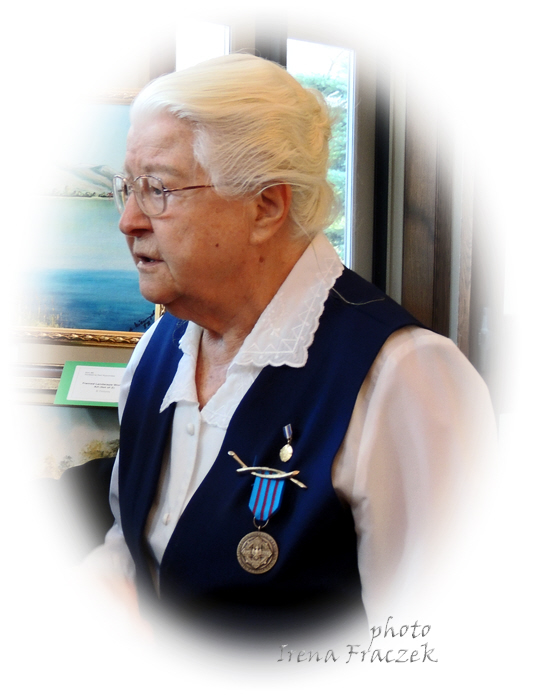 January 19, 2017 marked another milestone in the life of Pani Ada, who just turned 100. Loved and admired, she is an expert on Polish folk dance, gifted dance teacher and choreographer. She also wrote numerous articles on Polish traditions as well as the book "Polish Folk Dances and Songs: A Step-by-Step Guide" - the most comprehensive work on the subject in English. For all her accomplishments, she received many awards including the Cross of Merit of the Polish Republic (1994).
January 19, 2017 marked another milestone in the life of Pani Ada, who just turned 100. Loved and admired, she is an expert on Polish folk dance, gifted dance teacher and choreographer. She also wrote numerous articles on Polish traditions as well as the book "Polish Folk Dances and Songs: A Step-by-Step Guide" - the most comprehensive work on the subject in English. For all her accomplishments, she received many awards including the Cross of Merit of the Polish Republic (1994).
It was a long and winding path that led Ada from Poland to the United States. She arrived in 1947 with her husband, Kamil Dziewanowski (1913-2005), a historian and prolific writer on the history of Poland and Russia. The couple moved from Boston to Milwaukee in 1979, where he joined the faculty of the University of Wisconsin-Milwaukee and she became the artistic director and choreographer of the Syrena Polish Folk Dance Ensemble of Milwaukee.
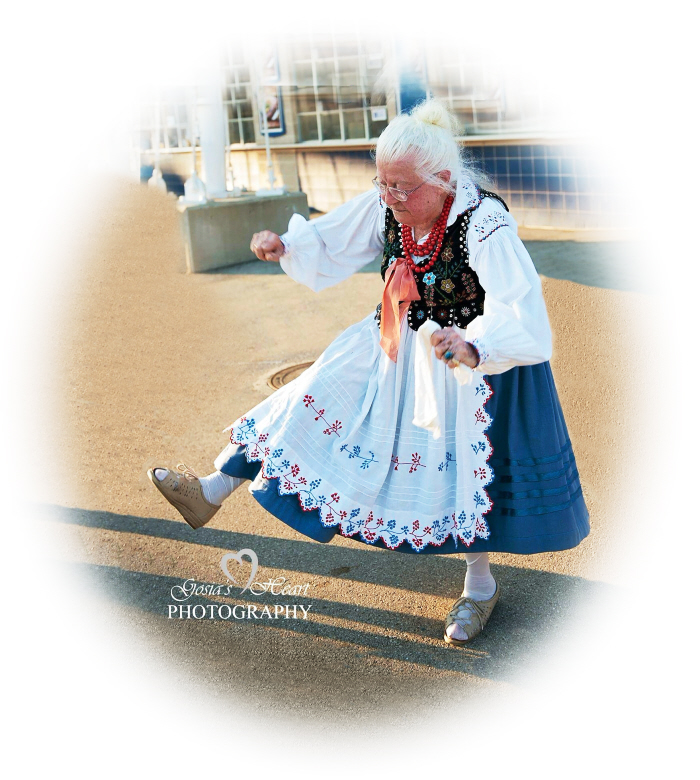 Ada Dziewanowska still holds this position today and apparently has no intention to stop dancing. As seen above on the Gosia's picture taken in June 2016, she danced to the Rolling Stones' "Paint It Black" just several months before her 100th birthday.
Ada Dziewanowska still holds this position today and apparently has no intention to stop dancing. As seen above on the Gosia's picture taken in June 2016, she danced to the Rolling Stones' "Paint It Black" just several months before her 100th birthday.
On the occasion of Pani Ada's centennial, a special presentation in honor of her life highlighted the 2017 Bal Maskowy (Masquerade Ball) held in Wisconsin Club on February 11th, 2017 with choreography put in the hands of Staś Kmieć, an award winning choreographer (currently artistic director of the Ballet Western Reserve in Youngstown, OH), who also happens to be the former student of Ada Dziewanowska and contributor to her book.
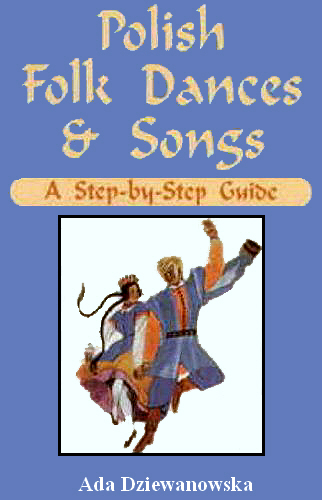
From the Amazon website: I was expecting a pamphlet and I received a treasure. Particularly, I enjoyed the background on the dances, the clarity of expression in describing the steps, and the author herself. A surprising plus, all the Polish words and captions are given a pronunciation key, a terrific help for those of us who have lost our heritage language.
For all of us who missed the 2017 Ball Maskowy, there is always another year as the ball is one of several great events that Syrena holds annually to promote Polish culture and traditions.
The group has its quarters in the historical building of former St. Hedwig's School in the second oldest Polish parish in Milwaukee. 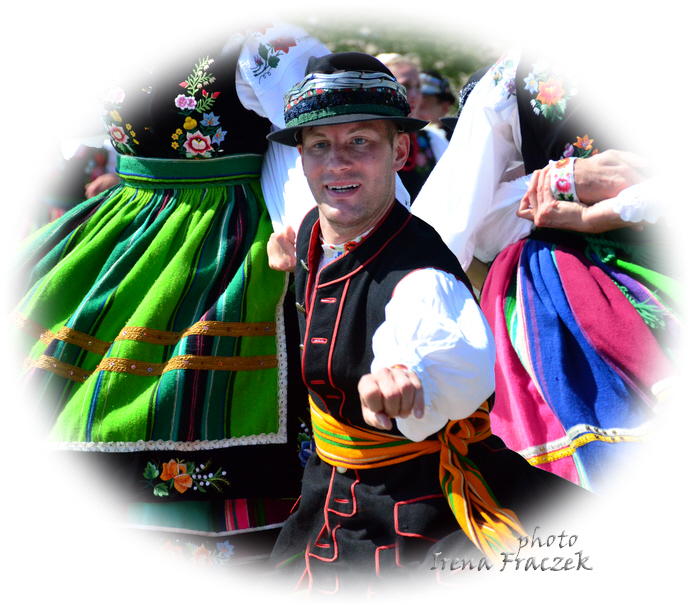 Syrena's repertoire of dances is truly impressive and the dancers take great pride to perform them in the authentic and beautifully hand-crafted Polish costumes (about 300 in the group's possession).
Syrena's repertoire of dances is truly impressive and the dancers take great pride to perform them in the authentic and beautifully hand-crafted Polish costumes (about 300 in the group's possession).
Numerous performances made the talented and skillfully trained Syrena dancers well known not just in the Milwaukee area, but also in many US cities and abroad (Canada, Poland and Japan).
The PHC members also had an opportunity to enjoy their spirited performance in Madison at our celebration of the 35th Anniversary of the Polish Heritage club in October 2015. See the video to the right and refresh memory of the experience....
We have 103 guests and no members online








 by
by 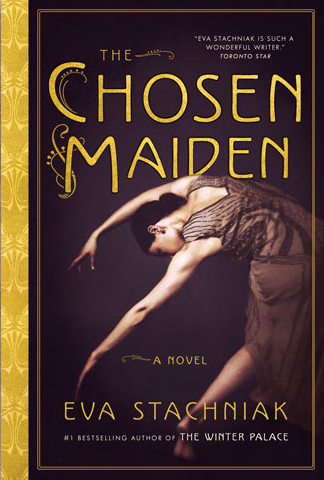 by
by 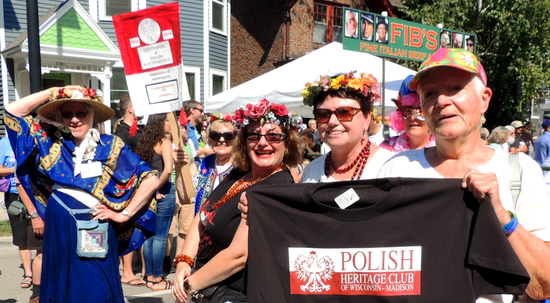

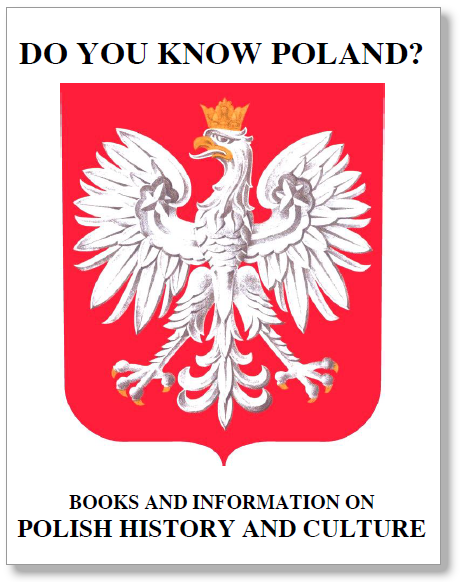


 by
by 


